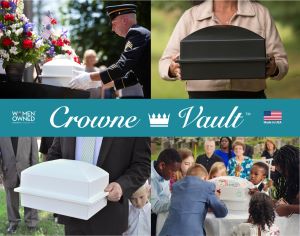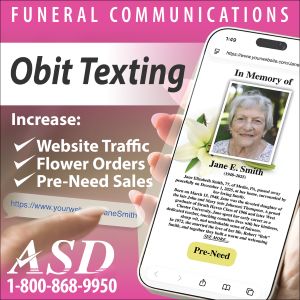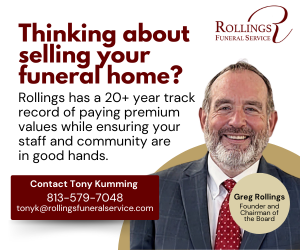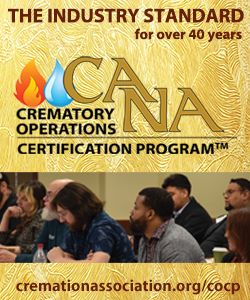Are there too many funeral homes?

The number of funeral homes in the US in the 1960’s, 70’s and 80’s was often quoted as 22,000, similar to the number of furniture stores at that time. Today, furniture stores exceed 67,000; in contrast the number of funeral homes has remained nearly the same as in the 1970’s.
The demand for furniture has grown with the increasing number of households, which is a factor of the population growth. If the population has grown to support 67,000 furniture stores, why has the number of funeral homes remained the same? Cremation has stifled the demand for funeral homes. A large funeral business in the 1970’s and 80’s did 300 to 400 cases, operated from one, maybe two locations. The great majority of firms did close to 100 calls from a single facility, with the family living upstairs and working in the business. The “family car” was literally, the family car. The funeral business was an excellent family business with superior profits and with minimal operating cost.
Today’s article for Funeral Director Daily is authored by Glenn Gould. For 35 years, Glenn Gould was CEO of MKJ Marketing, a death care industry marketing firm serving funeral homes, cemeteries and death care industry vendors in areas of Digital Marketing, Market Research, Advertising and Training Programs. MKJ was founded in 1982 and had over 3000 funeral home clients throughout the US and Canada. In 2021 MKJ was acquired by Tribute Technology, a Carlyle technology roll-up; Glenn has continued with TT as a marketing consultant.

Glenn Gould
Obviously, those days will never return; instead, the number of businesses conducting 1,000 or more cremations will likely quadruple over the next decade or two. Just like in the old days, the secret to a successful death care business is a matter of keeping the cost of operation low. Cremation businesses, operating from a single facility, with their own crematory, a minimal number of licensed staff can generate superior profits charging $2500 for direct disposal.
The funeral business operator in the 1970’s understood the families in the community and endeavored to meet their expectations. So do contemporary cremation businesses. The consumer is telling us they will not pay a lot for death care services.
Cremation was relatively rare in the 1960’s and 70’s. Today, demand for burial and mausoleum is relatively rare. And just as the consumer in the past sought out the businesses best prepared to serve them, burial families today seek out combinations as do consumers preferring mausoleum. All of this explains why the corporations are realizing growing sales year over year on fewer cases. SCI and Carriage both attribute their sales increases to their cemetery business and “non-funeral home” direct disposal businesses.
With burial and mausoleum business migrating to combinations, the cremation rates continue to increase at independent funeral businesses. Taking a lesson from the funeral homes in the past and present cremation businesses, the key for independents is to reduce their operating costs, but how?
Reducing the cost of operating an independent firm demands radical change. All of this suggests there are not too few funeral homes, but too many. It also challenges acquisition; acquiring another funeral home in a market could very well create too much overhead without increasing volume enough to generate a profit. Maybe, instead of acquisition, we should be exploring mergers. Merging businesses while selling excess facilities can create stronger, sustainable businesses while alleviating the staffing challenge. In markets with many, small volume funeral businesses, owners could join forces to create a larger business that could attract a consolidator to acquire or at least generate a reasonable profit while giving the owners flexibility and time off.
More about Glenn Gould:
As CEO of MKJ Marketing, Glenn assisted funeral homes and death care industry vendors in establishing marketing and advertising plans. He is recognized for his market research services having conducted over 800 positioning and prospective trade area studies throughout the US and Canada. In addition to quantitative research studies for funeral homes and cemeteries, Glenn moderated one-on-one interviews, focus groups and test panels.
In addition to MKJ Marketing, Glenn held executive positions with Bausch & Lomb, General Mills and the Batesville Casket Division of Hillenbrand Industries. He is a recognized speaker at industry conferences, seminars and conventions. His articles appear regularly in funeral service publications. His two books “Deathcare Marketing, 25 FAQ’s” and “Funeral Home Marketing-Moving The Bottom Line” have sold thousands of copies and are in use at mortuary colleges nationally.
Glenn has testified as an expert witness in multiple civil suits between funeral homes, served on the Board of Directors of the Pittsburgh Institute of Mortuary Science and instructed the Small Business Class for the St. Petersburg College, School of Mortuary Sciences. Glenn holds B.A. and M.S. degrees.

Tom Anderson
Funeral Director Daily
Funeral Director Daily take: I’ve been fortunate to get to know Glenn Gould through an annual Death Care event that we have both attended for several years. I’ve learned in that time that Glenn has a wealth of information and knowledge in many sectors of the Death Care profession. It’s always interesting to hear his perspectives and I am excited to bring those perspectives to the readers of Funeral Director Daily from time to time.
More news from the world of Death Care:
- U.S. funeral businesses are being squeezed by the rise of cremations. Sherwood
- Bipartisan effort underway to establish new legislation to hold funeral home directors accountable. WENY News (NY) and WTAE – Pittsburgh (PA)
- Regulation “profoundly’ changing the funeral market dynamic. Today’s Wills and Probate (Great Britain)
- Campbell and Sons Funeral Home recieves “Best of Georgia” regional award. CBS – 42 Birmingham (AL)
- Campbell and Sons Funeral Home website
Enter your e-mail below to join the 3,164 others who receive Funeral Director Daily articles daily:
“A servant’s attitude guided by Christ leads to a significant life”





















As someone who entered funeral service in 1978, I have witnessed the trends and demographics that impacted what we do. When I was an apprentice, before FTC, if we received a death call at night, the body would automatically get embalmed right away. Those days are but a memory for some of us.
I was recently involved in a new, start up cremation business in Nashville that hit 1,000 cases in its 1st 18 months in business and there were already a half dozen “discounters” in that market. I think however, and respectfully disagree with Glenn, who I’ve known since 1988, that it will be difficult to charge upwards of $2,500 when there will always be someone who will do it, and do it well, for $1,000.00. Time will tell.